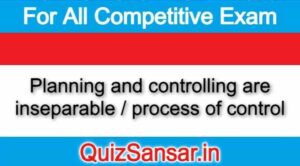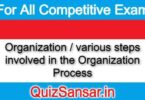
Planning and controlling are inseparable / process of control
Planning and controlling are inseparable twins of management. They are interrelated and interdependent functions of management. Without planning, there lies no basis for controlling, and vice versa.
Planning and Controlling are interrelated e and Interdependent Planning is the base of controlling function, as controlling involves measurement of performance against the standards to analyze deviations and take corrective action. Thus, controlling is impossible without planning.
Planning without controlling is meaningless, because in the absence of controlling, it is impossible to monitor the progress and keep a check on the proper implementation of plans. Thus, without controlling, planning will fail to achieve objectives.
Planning is a thinking process while controlling is an executive function. While planning involves creative thinking, imagination and sound judgement, controlling ensures that such decisions are converted into desired actions. Thus, planning is prescriptive, whereas, controlling is evaluative.
On the basis of the above discussion, it is concluded that planning and controlling are interrelated and reinforce each other because:
1. Planning based on facts makes controlling easier and effective.
2. Controlling improves future planning by providing information derived from past experiences.
Both are Forward-looking as well as Backward-looking Functions
1. Planning is a Forward-looking Function: Planning involves setting objectives and deciding the future course of action to achieve them. Thus, it is regarded as a forward-looking function.
2. Controlling is a Backward-looking Function: Controlling involves a post-mortem of the past activities of an enterprise and finding out deviations from the targeted standard. Thus, it is regarded as a backward-looking function.
3. Planning is a Backward-looking Function: Planning is guided by past experiences and corrective actions taken in the controlling process Thus, it is regarded as a backward-looking function
4. Controlling is a Forward-looking Function: The process of deviations and control necessarily involves analysing taking corrective action, which aims to improve future performance and achievement of predetermined goals. Thus, it is regarded as a forward-looking function.






